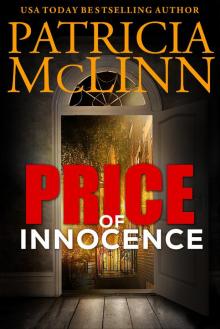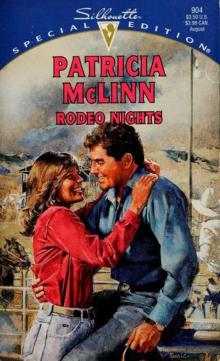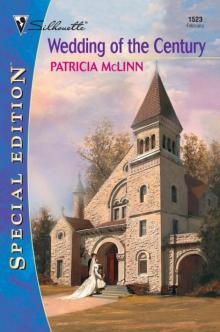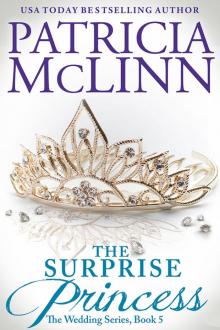- Home
- Patricia McLinn
Grady's Wedding
Grady's Wedding Read online
GRADY’S WEDDING
Patricia McLinn
Prologue
I now pronounce you husband and wife . . .
Grady Roberts felt as if he’d been hearing that phrase more often lately than “Have a nice day.”
It still echoed in his head as the reception shifted from the dinner phase to the dancing phase.
He smiled reflexively at the knockout redhead who’d ignored her date to make eyes at him as he’d sat with the others at the head table. She was truly a knockout. He was stupid to let it bother him that she looked at him like a succulent chocolate dessert she wanted to devour.
Then the bride and groom moved into the open expanse of polished wood floor to begin the dancing, and his smile softened.
God, Michael and Tris looked good together. Rightness glowed from them. A rightness that had spurred them to move up the date of their wedding three times, until the caterers, dressmakers and gift givers could only sprint like mad to keep up with the bride and groom’s eagerness. A rightness that left a hole deep inside him. Or maybe the hole had been there a long time, and the fact of his best friends getting married one after the other had simply brought it out of hiding.
Paul and Bette joined them on the dance floor. Then other couples.
First Paul and Bette, now Michael and Tris.
How could you be so happy for people and also feel so left out and so . . . what? He’d say lonely except that was an odd word for someone who’d never spent an evening—or night—alone unless he wanted to.
Even odder, he’d recently found himself spending more and more of his evenings and nights alone.
Maybe he just needed to get out more. Maybe that was all that was the matter with him.
“Grady? Grady, come back to earth.”
He blinked into focus on Bette Wharton Monroe’s smile. “Paul’s dancing with the bride. Are you feeling brave enough to dance with a pregnant lady?”
“For as long as the pregnant lady’s husband will let me.” He smiled back. “Which we both know won’t be long.”
A dance and a half later, Paul claimed Bette. Then Grady danced once with Tris before Michael claimed her. Even his dance with Judi—Paul’s kid sister and practically his own— ended with her father claiming her.
He looked around for Leslie Craig, the remaining member of the wedding party, Tris’s co-worker and her maid of honor. He wouldn’t mind dancing with her. She didn’t look at him like a high-caloric goody. Leslie more likely would slip in some pointed remark than gush or stumble over her words.
But she was still dancing with a man Judi had informed him was someone’s recently widowed uncle. Grady frowned.
The man looked young for an uncle and a widower. Some might even consider his gray hair and dark mustache distinguished. And from the way Leslie smiled, at least one person found them charming.
Grady turned away and danced on. The redhead. Friends’ mothers. Michael’s boss, U.S. Senator Joan Bradon. Leslie moved on to other partners, though the uncle showed up a couple more times, and Grady never could reach her before someone else did. He danced with miscellaneous relatives of Tris or Michael and assorted wedding guests. The redhead again.
She made it clear she was willing and eager. Trouble was, he wasn’t either one.
The dance ended, and she stayed at his side.
“All right, everybody, while the band takes a break, my cousin Tris is going to toss the bouquet.” Paul had a firm grip on the microphone and the crowd. Dancers wandered off the floor, anticipating his next announcement. “Will all the unmarried ladies please move over there by the doorway.”
The redhead gave Grady a look under her lashes, slid her hand down his sleeve until her fingertips brushed the back of his hand, then started across the floor to the designated area with a walk that should have gotten her arrested for attempted arson.
Maybe he just wasn’t flammable lately.
To let another bouquet candidate pass, he moved to his right, and bumped squarely into Leslie Craig.
“I don’t object when men trample on my affections,” she said in that faint drawl of hers, “but I draw the line at my toes.”
He grinned. “Sorry, Leslie.” He stepped back to open her path to the growing group of would-be flower catchers.
She didn’t move.
He stepped farther back, making the opening more obvious, even gesturing that the way was clear.
She arched a brow. “What’re you doing there, Grady? New dance step?”
“That would be the closest I’d come to dancing with you tonight.” Her hazel eyes glinted with humor at his dry response. “But what I was trying to do was politely let you past so you’d have a chance to catch the bouquet.”
She shook her head. “Thanks, but I’ll stay here.”
He saw Tris, already with her back to the growing group of women, glance toward Leslie.
“I think Tris is looking for you.”
“She’ll understand.”
“You object on feminist grounds?”
“Not me. I’m from the feminist school that says a woman can do anything a man can do—including love and marriage. No, I think bouquet tossing is a quaint and archaic tradition, and I’m all for that. You learn to cherish your quaint and archaic traditions when you’re from Virginia. It’s just that I’m too archaic myself to go in for this one.”
Grady had been watching Paul consult with Tris some eight feet away, but now turned to consider the woman by his side. He knew from Tris that Leslie was older than his thirty-three, but it couldn’t be by much.
Besides, he’d spent time with enough attractive women to qualify as something of an expert, and her appeal was the kind age didn’t diminish. It came from her bones, and her brain. He’d spent many childhood hours with old movies as his only companions, and he could see a lot of the young Katharine Hepburn in Leslie Craig.
But he was too late to make his observations. She’d continued the conversation without him.
“Believe it or not, Tris and Michael want to get things moving faster. You’d think moving their wedding up from June to late April would be fast enough for anybody.”
She smiled at him, a friend sharing their mutual friends’ happiness, and he felt the uncharacteristic urge to ask her if she didn’t have any of the feelings he’d been experiencing. The left-out feeling. The wondering about when—or if—it would ever be his turn.
Doubly uncharacteristic. To have the feelings, and then to consider confiding them. Even Paul, who’d been his first friend, would be astounded if Grady Roberts ever said what he’d just been thinking.
Leslie’s smile had slipped and she studied him in some puzzlement.
In their encounters since Tris introduced them last fall, he’d realized Leslie was a perceptive woman. Dangerously so. He turned on his smile. “They do seem in a hurry, don’t they?”
In the background, he heard Paul giving final instructions.
All Leslie’s puzzlement didn’t disappear, but her smile returned. “I heard Tris telling Paul that if he wanted her to throw this bouquet he’d better get a move on because she had a honeymoon to start. And Michael flat out said he wasn’t going to waste time throwing the garter. He was going to hand—”
A missile struck Grady a glancing blow on the right shoulder, deflected straight at Leslie Craig’s chin and shed three petals before dropping into the hands she’d instinctively raised.
A whoop went up from the general direction of Tris, Michael and Paul, quickly picked up by the rest of the crowd.
Leslie’s head was bent over the bouquet that had landed in her hands, so Grady had to bend to get a look at her face.
She looked stunned.
“You okay, Leslie?”
“Okay
?” She still stared at the flowers.
“You took it square on the chin. It wasn’t a knockout punch, was it?”
“No. No, I’m okay.” She finally looked up, but not at him. “You’re a low-down rat, Tris Donlin.”
Grady looked around as Tris, Michael, Paul and Bette converged on them. In the background the women who’d waited in vain dispersed, most smiling, a few—including the redhead—looking put out.
“Tris Donlin Dickinson now,” the rat corrected with no embarrassment.
“You should have seen that throw, Grady,” enthused Paul. “She could have been playing for the Cubs with that pickoff move. She winds up like she’s going to throw to the plate, then—whoosh—zips it over to first base.”
Leslie’s narrowed eyes bored into Tris. “Only she threw to somebody sitting in the stands, happily sitting in the stands.”
“I wanted you to have it. It’s my wedding day. Shouldn’t I get to decide who gets this bouquet?”
“That’s low-down and sneaky, appealing to my sentiments that way and—”
“I learned it from the best,” Tris tossed back at her.
“You could have just handed it to me instead of pelting me with it, not to mention setting up false hopes for all those girls over there.”
“Those were exactly my thoughts,” said Michael. “That’s why I decided to skip the part where the groom throws the garter. Here, Grady.”
When a friend extends a hand to give you something, it’s automatic to take it. You don’t stop to consider whether you really want to accept the item. At least, Grady didn’t stop to think. So he ended up with a circle of flowery lace resting in his wide palm.
“What’s this?”
“It’s the garter, what do you think it is?” demanded Paul. “You can’t tell me you’ve never seen one before. But this one’s special,” he added with a wicked grin. “This one means you’ll be the next one married.”
Feeling as if he’d also taken a blow to the chin, Grady looked around the circle of his friends, then at Leslie.
“But right now what you do,” continued Paul, “is go out in the middle so everybody can see, and then you put the garter on the leg of the woman who caught the bouquet. That’s what you do.”
“Oh, no, he doesn’t.” Leslie was adamant.
“It’s the tradition,” Paul persisted.
“No way."
Grady looked from one to the other. Sounded as if Leslie had no intention of cherishing this tradition. Come to think of it, he didn’t remember this particular tradition being followed at Paul and Bette’s wedding last August.
“But—” Paul started before Bette stepped in quietly.
“How about if we make our own tradition.”
“Bless your heart,” breathed Leslie.
“What? What did she say?” Paul asked.
“She said, ‘Bless your heart,’ ” Tris told her cousin. “She says it a lot. It’s a sort of multipurpose Southern expression Leslie uses for any occasion. Right now I think she’s using it to say thank-you to Bette for saving her from the garter-on-the-leg tradition.”
On cue, Bette went on, “Why don’t we have the man who has the garter dance the next dance with the woman who caught the bouquet. That’ll be the new tradition. Okay?”
Grady heard the band start up. He heard Leslie muttering about there being a big difference between catching a bouquet and fending it off out of self-defense.
Maybe he just needed to get out more. Maybe that was all that was the matter with him.
And maybe not.
He closed his hand around the scrap of lace and took Leslie Craig in his arms for their dance.
Chapter One
Grady Roberts opened his top left-side dresser drawer, repository of all the things he didn’t know what to do with, and, first thing, he saw the garter.
He thought he’d packed everything he’d need for this trip to Washington, but more business trips than he cared to count had taught him to take one last look.
And there, amid single cuff links, hotel shoe-shine kits, toothpicks, an old pocketknife, matchbooks and spare change—in fact, right on top of them—rested that white band of fabric Michael had handed him at the wedding two and a half weeks ago.
He’d shoved it in his tuxedo pocket after that single dance with Leslie Craig. Later he’d seen it on the dresser when Harriet, his housekeeper, sent the tux to the cleaners before last week’s museum board benefit. He’d left it on the dresser because it didn’t seem right to throw it out, but what did you do with a bride’s garter?
Apparently Harriet had figured the best thing to do was to put it back where she’d found it, because he’d discovered it in his pocket during the benefit. He couldn’t blame the garter for his not enjoying the company of his stunningly beautiful and stunningly boring date, but the fact was, when he came home—early—that night, he’d taken the garter out of his pocket and dumped it in this drawer with something close to irritation.
And there it had stayed until now.
He could throw the thing out. He stood there looking at it, making no move toward the wastepaper basket. Or . . .
“What the hell.”
With that fatalistic mutter, he picked up the bit of material, tossed it in his open suitcase and slammed the drawer closed.
* * * *
“How about this?”
Leslie Craig looked at the massive Chinese gong Grady Roberts stood next to. It was the largest thing in the Georgetown antique store he’d made their first stop. An antique store in Georgetown and one in a trendy mall, for heaven’s sake. The man didn’t have a bit of shopping sense.
He’d called out of the blue Thursday, said he’d be in Washington over the weekend and would she be available Saturday to help him select a housewarming gift for the home Paul and Bette had just bought in suburban Chicago. With Tris and Michael still off on their honeymoon, he really could use some help shopping in D.C., he’d said. She’d said yes.
She sighed mentally. Grandma Beatrice had always said men had to be schooled in gift buying just the way they are in world history. Grady Roberts, she feared, would require remedial work.
“I don’t think so, Grady.”
A tuck appeared between his brows. Lord, even the man’s frown was more appealing than most men’s widest smiles.
“Why not?”
Despite the appeal, she moved closer so she could lower her voice out of hearing range of the supercilious clerk lurking in the vicinity.
“If your heart’s set on an antique, there are some towns a little way out we could try. They’re much more reasonable.”
His frown cleared. “The money doesn’t matter.”
She’d tried the oblique approach, now it was time for direct. “Maybe not to you, but how about to Paul and Bette? How do you think they’d feel having something sitting in their living room that cost as much as half a year’s mortgage payments?”
He looked stubborn.
“Of course, when I say sitting in their living room, that’s only a guess. Where exactly do you put a genuine Chinese gong? And what on earth would you use it for? I can’t imagine Bette calling Paul and their kids-to-be in to dinner with it.”
“Not everything has to be useful,” he argued, but the stubborn look had disappeared.
“True, but then it should be something the person getting the gift can truly love. You think Paul and Bette would love this?”
The surface didn’t ripple, but Leslie thought she saw reactions flicker across the clear blue of his eyes. Poor soul, it was a whole new concept for him. Wouldn’t do to throw someone at the remedial level right into a graduate course. Better to ease him into it.
“Why don’t we look around a little more,” she suggested smoothly. “And you can tell me more about the house Paul and Bette are buying.”
He let her ease him out of the antique store and on to other shops that shared at least one theme—outrageous prices. So, she confirmed to herself, he hadn’t real
ly had his heart set on the gong or even an antique, because if he had she didn’t fool herself into thinking Grady would have been so easily swayed.
Why on earth had she agreed to accompany him on this shopping expedition?
Because she couldn’t resist.
Not because of his looks, though looks he certainly had— a couple inches over six foot, no extraneous inches anywhere else, blond hair, blue eyes, features both regular and manly. Women definitely looked twice.
That was not a recommendation in Leslie’s eyes, however. If anything, his handsomeness and easy charm had made her dismiss him when they met last fall.
But Tris and Michael, Paul and Bette—people Leslie liked and admired—had been friends with Grady for a long time, so surely there was something. And then she’d thought she’d caught glimpses of it herself, especially at the wedding.
Well, there you had it, as Grandma Beatrice would say. A challenge ready-made for Leslie Aurelia Craig. A lost soul— all the more lost because he didn’t know he was a lost soul— clearly in need of a little gentle guidance.
Besides, she liked Paul and Bette, and for a couple starting off in their first home to be saddled with something like that gong . . . Especially since Grady would be too near at hand for them to sell the thing at their first garage sale.
* * * *
This was not going the way Grady had planned.
They’d wandered in and out of Georgetown shops for nearly two hours. He would guide them in, hoping to get this gift bought and shipped, and she would usher them out, not satisfied with any of his proposals. Finally he talked her into a glass of wine and some fruit and cheese in the tree-shaded courtyard of a small restaurant he knew.
This was more like it, he thought as he considered Leslie. Elbows propped on the table, she rested her chin on the backs of her hands, which she’d templed over the wineglass. The position displayed the clean line of her profile beyond a sweep of brown hair glinting with red and gold.
She had beautiful hands. Long, slender fingers and a narrow palm. Soft, but not the least bit fragile. They were hands that accomplished things with a delicate touch.

_preview.jpg) Almost a Bride (Wyoming Wildflowers Book 1)
Almost a Bride (Wyoming Wildflowers Book 1)_preview.jpg) Prelude to a Wedding (The Wedding Series Book 1)
Prelude to a Wedding (The Wedding Series Book 1) Reaction Shot (Caught Dead in Wyoming, Book 9)
Reaction Shot (Caught Dead in Wyoming, Book 9) Warm Front
Warm Front Price of Innocence
Price of Innocence Body Brace (Caught Dead in Wyoming, Book 10)
Body Brace (Caught Dead in Wyoming, Book 10) Death on Covert Circle
Death on Covert Circle Making Christmas
Making Christmas Death on Torrid Ave.
Death on Torrid Ave. Death on the Diversion
Death on the Diversion The Rancher Meets His Match
The Rancher Meets His Match Widow Woman
Widow Woman The Runaway Bride
The Runaway Bride Hoops
Hoops A Stranger in the Family (Book 1, Bardville, Wyoming Trilogy)
A Stranger in the Family (Book 1, Bardville, Wyoming Trilogy) Rodeo Nights
Rodeo Nights Wedding Series Boxed Set (3 Books in 1) (The Wedding Series)
Wedding Series Boxed Set (3 Books in 1) (The Wedding Series) Sign Off (Caught Dead in Wyoming, Book 1)
Sign Off (Caught Dead in Wyoming, Book 1) Prelude to a Wedding
Prelude to a Wedding MATCH MADE IN WYOMING
MATCH MADE IN WYOMING Left Hanging
Left Hanging What Are Friends For?
What Are Friends For? Proof of Innocence
Proof of Innocence Hidden in a Heartbeat (A Place Called Home, Book 3)
Hidden in a Heartbeat (A Place Called Home, Book 3) Baby Blues and Wedding Bells
Baby Blues and Wedding Bells Least Likely Wedding?
Least Likely Wedding? Heart Stealers
Heart Stealers Grady's Wedding
Grady's Wedding Right Brother
Right Brother Wedding of the Century
Wedding of the Century Sign Off
Sign Off The Surprise Princess
The Surprise Princess Wyoming Wildflowers: The Beginning
Wyoming Wildflowers: The Beginning